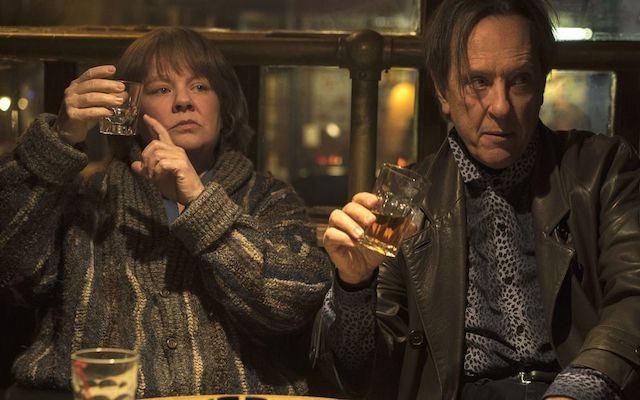
Lee Israel was a cranky journalist who made a living writing biographies before falling on hard times after the failure of her unauthorized 1985 Estee Lauder book, which Lauder undermined by preemptively releasing an autobiography. The excellent “Can You Forgive Me?,” based on Israel’s own memoir, tells the story of what happened next: Desperate for income, Israel began forging letters from literary figures and selling them to collectors. She’d find old typewriters to mimic outdated typefaces, and use her own talents to research and mimic the voices of people like Noel Coward, Dorothy Parker, Lillian Hellman, and Ernest Hemingway.
The film, directed by Marielle Heller (“The Diary of a Teenage Girl”) and starring Melissa McCarthy, is primarily a dark comedy, but it has an extra bit of gloom hanging over it as we wait for Lee’s fraud to be found out. She’s an abrasive, prickly person, and what she’s doing is obviously illegal — but at the same time, we like her (or at least understand her), and it’s a fairly harmless crime anyway, and can’t we work this out somehow?
We meet the surly and frumpy Lee at age 51, working some dead-end office job, drinking scotch at her desk before getting fired for swearing at the boss. She lives in depressed squalor in Manhattan, making periodic attempts to get the attention of her agent (Jane Curtin), who keeps telling her nobody wants a biography of Fanny Brice (one begs to differ) and that if she wants to be as successful as Tom Clancy, she needs to play the publicity game. “You can be an a**hole when you’re famous,” the agent says. “When you’re a nobody, you can’t be such a bitch.”
Needing money to buy medication for her aged cat, Lee digs up a personal letter she once received from Katharine Hepburn and sells it to one of the many people in New York who deal in such memorabilia. She happens upon a Fanny Brice letter, too, but is told by the dealer, Anna (Dolly Wells), that it isn’t worth much because the content is kind of dry. Noticing that her typewriter at home matches the font in the Brice letter, Lee adds a witty, acerbic P.S. in Brice’s style and makes the sale (to a different dealer, of course).
The ruse evolves from there, aided by Lee’s natural cleverness and her heavy drinking, which removes the urge for self-reflection. In addition to working out the aesthetic trickery to make new paper look old, she researches real letters to learn the writers’ styles, producing well-written, convincing forgeries. Ironically, it’s the best work of her career.
In the midst of all this, Lee re-meets Jack Hock (Richard E. Grant), a flamboyant, promiscuous gadabout and part-time cocaine salesman whom she once met at a book party, where he got so drunk he peed in a closet. With their shared queerness, alcoholism, and general misanthropy, Lee and Jack become pals and partners in crime (first figuratively, then literally). They make prank phone calls to people who have wronged them — an absurdly funny activity when the giggling participants are in their 50s — and they stumble around town drinking and sniping. “This is a celebratory drinking session, not a wallowing one,” Lee says after making a sale. “It can be hard to tell the difference with you,” Jack replies.
But Lee has trust issues. Her one romantic relationship ended some time ago, presumably her fault. She treats Jack like a drinking buddy, not a true friend, and won’t open up to him. She’s always written biographies — other people’s stories — because producing something personal would make her too vulnerable. In large part, “Can You Ever Forgive Me?” (the title comes from a Dorothy Parker letter) (a real one) is about Lee’s halting, reluctant efforts to become a less miserable and off-putting human being.
That’s why it’s crucial that the movie doesn’t end with the scam being found out, but continues on through the aftermath so we can see the character’s arc to its completion. And while dowdy, pitiable characters, even mean ones, are in McCarthy’s wheelhouse, she does something here that she hasn’t really done before: She gives Lee emotional depth. With the help of a well-crafted screenplay by Nicole Holofcener (“Lovely & Amazing,” “Enough Said”) and Jeff Whitty, McCarthy brings out the relatable aspects of Lee’s personality so we’ll sympathize with her instead of just finding her amusingly pathetic. It’s a fine-tuned performance, McCarthy’s outsized comic sensibilities channeled into in a non-farcical, three-dimensional character.
Richard E. Grant proves a fine counterpart, in a role not far removed from the drunken flaneur he played in the 1987 cult classic “Withnail & I.” Physically, he and McCarthy have the classic comedy duo dynamic — one tall, slender, and elegant; one short, dense, and blunt — and their chemistry produces some good laughs. Both figures are sad and broken in various ways, and part of the film’s pleasure is in seeing them help one another get better. Director Heller administers those soft, warm moments so subtly that they sneak up on you, never getting in the way of the movie’s curmudgeonly heart.
B+ (1 hr., 47 min.; )





